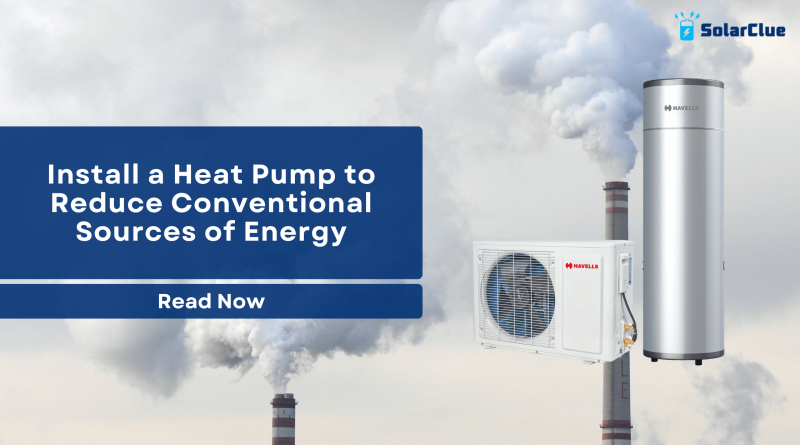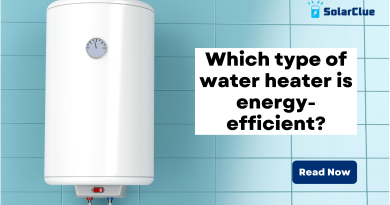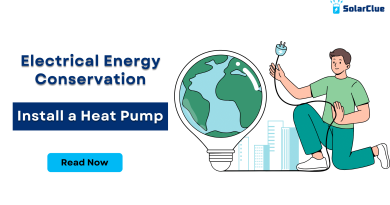Install a Heat Pump to Reduce Conventional Sources of Energy
Most of the appliances we use operate on conventional sources of energy. It not only hampers the environment, but also increases monthly electricity bill. In today’s world, reducing our reliance on conventional sources of energy has become a top priority. For that, we must adopt appliances like a heat pump, which uses non-conventional sources of energy.
In this blog, we will talk about conventional and non-conventional sources of energy, and how heat pumps help reduce the consumption of conventional sources of energy. Let’s get started!
Table of Contents
Why Should We Reduce Conventional Sources of Energy?
Conventional sources of energy refer to non-renewable resources like coal, oil, and natural gas. Non-renewable source of energy like fossil fuels are not only finite but also contribute significantly to greenhouse gas emissions and environmental degradation. By contrast, non-conventional or renewable energy sources, such as solar, wind, and geothermal, are sustainable and have a much lower environmental impact.
The key difference between conventional and non-conventional energy resources lies in their renewability and environmental footprint. While conventional sources are depleting and harmful, renewable sources like heat pumps harness natural energy flows, making them a more sustainable and eco-friendly choice.
There are many advantages of renewable energy sources. First, they help reduce our carbon footprint and mitigate the effects of climate change. Second, they promote energy independence and security by reducing our reliance on finite fossil fuels. Finally, many renewable energy technologies, including heat pumps, are cost-effective in the long run, making them an economically viable option.
What is a Heat Pump?

A heat pump is a water heating device, to meet your daily hot water needs. It is energy-efficient, as it uses less electricity than other traditional water heaters. The difference lies in the working principle. Any traditional water heater, like a geyser, uses direct electricity to heat water. Whereas, a heat pump uses electricity to only transfer heat from one place to another. This heat is used to produce hot water, rather than electricity.
How a Heat Pump System Works?
A heat pump works on the principle of transferring heat from one place to another.
This system consists of two main components: an indoor unit and an outdoor unit.
The outdoor unit has two parts – an exhaust fan and a compressor. The indoor unit is the storage tank, where water is stored.
The exhaust fan absorbs heat from the surrounding air, while the compressor compresses the refrigerant gas, increasing its temperature. This heated refrigerant gas then passes through a spiral condenser inside the indoor unit, transferring its heat to the water stored in the tank. This process continues until the desired water temperature is reached.
Unlike traditional geysers that use a significant amount of electricity to generate heat, heat pumps consume less energy by simply moving heat from one place to another. This makes them more energy-efficient and cost-effective in the long run.
Do Heat Pumps Use Renewable Source of Energy?
Yes, heat pump water heaters do utilize renewable energy. Though heat pumps use both renewable and non-renewable sources of energy, they are said to be up to 90% renewable. They require a small amount of electricity to operate the compressor and fan, the majority of the energy they use comes from the heat absorbed from the surrounding air, which is a renewable and abundant source of energy. This makes them an excellent choice for those looking to reduce their monthly electricity bill, plus contribute towards a sustainable future.
What Are the Benefits of Heat Pumps?

Heat pumps come with many advantages. Let’s have a look at them:
1. Cost-Effective
Heat pumps have high upfront cost. However, they make up for it through lower operating costs. Heat pumps transfer heat rather than generating it directly. This uses far less electricity – up to 75% less. Over its 10-15 year lifespan, a heat pump can save you hundreds or even thousands in energy costs. So it is actually a cheaper alternative to other traditional water heaters like geysers.
2. Long Lifespan
With proper maintenance, heat pumps last 15 years or more – significantly longer than standard electric geysers (8-10 years). So there is no need for replacement for a long time. This extended life cycle also contributes to it being a cost-effective option.
3. Reduced Water Wastage
Traditional water heaters constantly heat and reheat the same water, leading to significant energy losses. Heat pumps are automatic system as it heats water more efficiently. So when you run the hot water tap, the hot water flows instantly, and you don’t have to wait for it to flow. This results in a decrease in wastage of water. This conserves water, especially in households with long pipe runs.
4. Positive Environmental Impact
By consuming significantly less electricity than conventional water heaters, heat pump water heaters have a lower carbon footprint and contribute to reducing greenhouse gas emissions. This positive environmental impact is achieved by relying on renewable energy sources (ambient air) and minimizing the use of fossil fuels for power generation. Additionally, the longer lifespan of these systems further reduces the environmental impact associated with manufacturing and disposing of water heaters.
5. Efficient in Cold Climates
One common misconception about heat pump water heaters is that they may not perform well in colder climates. However, modern heat pump water heaters are designed to be efficient even in low temperatures. They can effectively extract heat from the surrounding air, even when the temperature drops below freezing. This makes heat pump water heaters a viable and energy-efficient option for hot water needs in various climates, including colder regions.
6. Manual Temperature Setting
Most heat pumps allow you to change temperature as per your requirements. This ensures you have hot water when needed without wasting energy by overheating the water beyond your requirements.
7. Availability in Different Sizes
Heat Pumps normally have an indoor and an outdoor unit. But many homes in India, specially in big cities, may not have that space available. For that, a single-unit heat hump is designed. It is also called Integrated Heat Pump.
Conclusion
Adopting renewable source of energy is very important, as it helps the environment. Additionally, it is also a cost-effective alternative to convention sources of energy. It is now time for Indian households to install heat pumps to meet the daily hot water needs. This will lead to a sustainable future for ourselves and the generations to come.
Visit SolarClue® to see the best heat pump water heaters. SolarClue® is an online marketplace where solar energy products are sold at discounts up to 50%.




